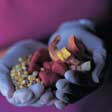 Eat
your procyanidins In general, plant foods are thought to play two powerful roles as anti-carcinogens. First, they help neutralize free radicals. To generate energy, millions of chemical reactions within the body must take place. During these reactions, some of the electrons get moved into strange, unstable configurations. These unpaired electrons are called free radicals. Free radicals are a byproduct of metabolism and have the ability to oxidize neighboring cells and create abnormal changes by attaching to genetic material (DNA). Defining the "somehow" is what drives his research. Phytochemicals in fruits and vegetables attach to free radicals, taking away the ability of these unstable molecules to affect surrounding cells. Secondly, they induce enzymes in the body that repair damaged cells and make toxins water-soluble so that they can be excreted in urine. Fruits and vegetables are loaded with compounds that do both - compounds like flavonoids. Flavonoids serve many roles in plants. Some, like the bitter tannins found in tea and wine, repel insects. Others put the colorful hue in fresh produce. "Eat your colors - that's pretty good advice for a healthy diet," said Mitchell. Mitchell is interested in procyanidins, a flavonoid found in all kinds of common foods: grapes, barley, green tea, peaches, apples, red wine, berries, even cocoa. Procyanidins make your body produce enzymes called glutathione S-transferases (GSTs). GSTs are part of a family of protective molecules known as phase 2 enzymes. These little worker cells mop up free radicals and otherwise do all the heavy lifting of detoxifying molecules before they can cause DNA damage. "Glutathione S-transferases are ubiquitous - your body makes them in virtually every cell," said Mitchell. "But more is definitely better. They are the most important defense system we have to protecting against chemical carcinogens. And they can't be replicated in pills."
Home |
Table of Contents |
To our Readers |
Building on Basics UC Davis Health System | © 2000, 2001, 2002 UC Regents. All rights reserved. |
"Glutathione S-transferases are ubiquitous -your body makes them in virtually every cell." |

